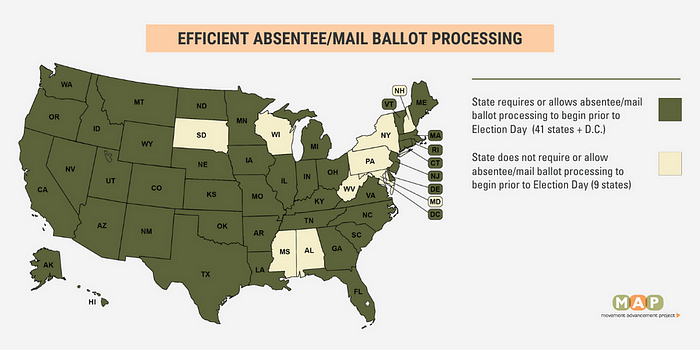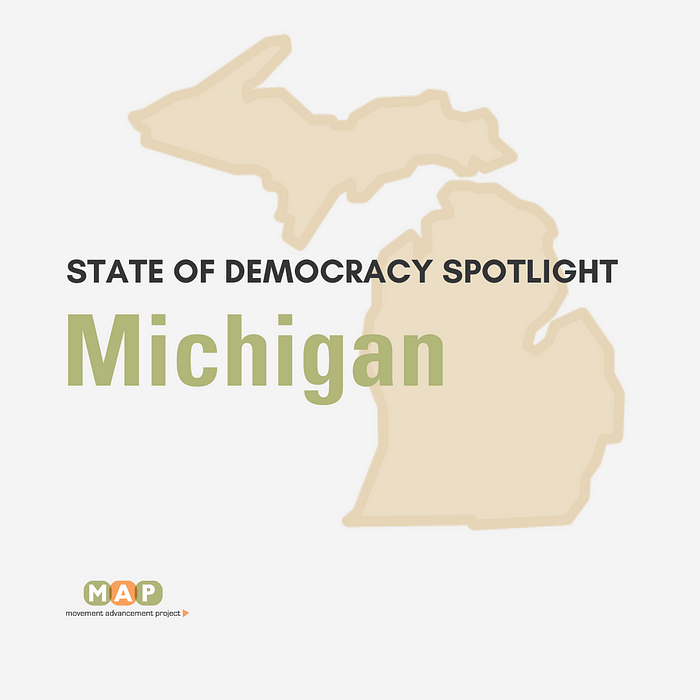State of Democracy Spotlight Series: Michigan
With the midterm primary season coming to a close and focus shifting to the November general election, Movement Advancement Project (MAP)’s State of Democracy Spotlight Series will profile a different state each week.
This series provides an overview of the current voting landscape, key issues that are coming up in that state, and why it matters for the overall state of democracy in this country. These spotlights outline policies that will impact what voting may look like in a number of battleground states and will provide overviews of how voting and election laws have changed since the 2020 election, for better or for worse.
See the full state profile for Michigan, which outlines how Michigan ranks in the six categories of policies we track, and a detailed list of which voting and election laws Michigan has in place. Previous State of Democracy Spotlights have featured Florida and Georgia.
Michigan will play an outsized role in the election this November as voters decide their next governor and weigh in on ballot measures to protect abortion rights and voting rights. In addition, legislative gridlock concerning updates to absentee ballot processing policies will contribute to delayed election results and could lead to increased misinformation and denial of election results. The state has also been a center of efforts by Republicans who are urging poll watchers to violate rules and potentially intimidate voters.
New Absentee Ballot Policies May Still Delay Election Results (and Lead to Election Challenges) this November
[Updated 10/10/22: As of Friday, Oct. 8, a bill signed into law by Gov. Whitmer provides a two-day window before the election for officials to open return envelopes with mail-in ballots. This preprocessing allows officials to confirm that ballot numbers match the envelopes containing them; the ballots themselves, however, cannot be counted or removed from their secrecy sleeve.]
Michigan’s delay in processing mail ballots was a key factor in the furor surrounding the 2020 election, and as things currently stand, Michigan is ripe for a repeat.
Michigan is one of 41 states that allows preprocessing of absentee ballots to begin before Election Day.

Following the 2020 election, delayed processing of mail ballots in states like Michigan led to a five-day period before the results of the presidential race could be called by media outlets. This gap in time was filled by misinformation by politicians and other figures seeking to sow doubt about election results and promote now debunked theories of voter fraud. This scenario is almost certainly set to recur in 2022.
Note that the pre-processing of absentee ballots does not involve tallying or releasing results ahead of Election Day, but rather taking steps such as verifying voter signatures and opening ballot envelopes so that counting can later be done more quickly. The lack of preprocessing is particularly problematic given the rise in absentee voting and the ways in which vote count delays are now being used to sow doubt and undermine America’s democracy.
Local election officials, the Secretary of State, and the Governor called for a legislative fix to allow pre-processing of ballots. The legislature struck a deal to allow absentee ballots to be preprocessed starting two days prior to the election, which was recently signed into law.
[Updated 10/10/22: The Bipartisan Policy Center recommends these best practices to mitigate potential delays:
- Seven days of preprocessing time
- Permission for election officials to start scanning and tabulating ballots
- Adequate time for voters to correct, or “cure”, their ballots]
Note that over 1 million Michiganders voted by mail in this year’s primary alone.
Republican Leaders in Michigan Urged Poll Watchers to Violate Rules
Adding to potential chaos surrounding a delayed count of mail-in ballots, some Republican leaders in Michigan have urged poll watchers to intimidate voters. These actions will further put Michigan at the center of likely post-election challenges. Poll watchers will be asked to follow the law but the enforcement of election laws against Republican poll watchers can in and of itself be leveraged to falsely claim election bias.
Since the 2020 election, the U.S. has witnessed a marked increase in political violence, including a surge in partisan poll watcher activity, where volunteers monitor activity at the polls, and in some states individuals have the ability to challenge a voter’s eligibility. Republican leaders and activists have been part of a campaign to ramp up these activities for the 2022 election.
- In Michigan, concerns around the activities of partisan poll watchers were already realized in the state’s primary in August. Reporting by CNN has revealed that during a virtual training session for partisan poll watchers before the primary, Wayne County Republican leaders urged attendees of the call to violate election rules by bringing pen and paper to record notes and to “act like spies.” Leaders on the call also suggested poll watchers involve law enforcement in election-related complaints, which could potentially lead to disruptions and voter intimidation.
- Most recently, a poll worker in western Michigan was charged with falsifying election records after allegedly tampering with voting equipment during the state’s August primary.
Citizen Initiatives Have Been Used to Strengthen Michigan’s Democracy in the Past — And May Again this Year
Despite the likely issues with vote counting delays and partisan poll watcher interference, Michigan’s democracy overall is strong — in part due to citizen initiatives.
In 2018, Michigan voters approved Proposal 3, which implemented a number of positive election and voting policies in the state. Among other changes, the measure enacted same-day voter registration, no-excuse absentee voting, and automatic voter registration. These changes dramatically improved Michigan’s election system, which is reflected in its high Democracy Tally.
This year, voters in Michigan will again have a chance to pass a ballot measure to improve their state’s election system and strengthen their democracy. Proposal 2, known as “Promote the Vote,” is now on the ballot after a brief court battle with the state board of canvassers.
Proposal 2 would amend the state constitution to:
- Implement nine days of in-person early voting,
- Require pre-paid postage for absentee ballots,
- Allow private charity funding of election administration
- Improve requirements for ballot drop boxes,
- Enact safeguards to ensure that audits are conducted legitimately and that election results are certified based only on official counts.
Michigan Has a Relatively Strong Democracy Tally
In part thanks to the citizen initiatives described above, Michigan ranks 10th in the nation in our Democracy Tally for its voting and election policies, making it a strong democracy overall. The Democracy Maps track 45 laws and policies for each state, which inform this tally.

▸▸ Voter Registration
Michigan rates high in the policy area of Voter Registration, with all of the policies MAP tracks that positively impact voter registration.
- Michigan is one of 22 states with automatic voter registration, which is proven to increase voter turnout. The state could strengthen this policy further by implementing back-end automatic voter registration, which results in even higher voter turnout.
- Michigan is one of 42 states that allows online voter registration, and is one of 21 states that allows voters to register on Election Day.

▸▸ Representation and Participation
Michigan ranks high in the category of voter representation and participation with important policies in place, including:
- The state’s automatic restoration of voting rights for formerly incarcerated people.
- Michigan has a high voter registration rate (90.4% in 2020) and a high voter turnout percentage (73.9%).
▸▸ Voting by Mail
Michigan also ranks highly in terms of mail voting policies, as the state allows no-excuse absentee voting.
- The state also has positive laws related to ballot drop boxes and permanent absentee voting.
- Michigan could improve in this area by adopting all-mail elections, where every eligible voter is proactively sent a mail ballot.
▸▸ Election Independence and Integrity
Michigan ranks lower in the area of Independence & Integrity.
- This shortfall is due to a lack of policies like a state-level voting rights act and a lack of laws to protect election officials from threats and harassment.
- Finally, as mentioned above, the lack of early processing of mail-in ballots presents a serious flaw in Michigan’s democratic system — a flaw that can be exploited by election deniers across the nation.
Michigan will certainly be a state to watch in November. While the state has a relatively strong democracy and accessible voting policies, it almost certainly will see a delay of election results and increased danger posed by partisan poll workers. This could lead to Michigan being a center of conspiracy theories and election denialism in a repeat of the 2020 election. Lawmakers still have time to act to protect our democracy and allow pre-processing of absentee ballots in order to close the gap that misinformation and lies can fill.

